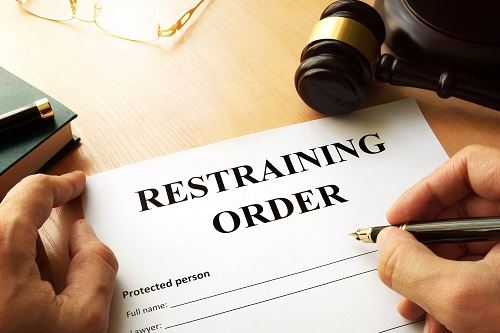
How to File a Restraining Order in Iowa
Call a Des Moines Family Law Attorney: (515) 200-7571

Civil protective orders do not require an arrest in Iowa, so even if the police didn’t charge your spouse with abuse, you can still file a restraining order against him or her. To prepare for the petition, write down a detailed history of your abuse with approximate dates.
In general, you’ll want three main details: the first time you were abused by your significant other, the most recent time they abused you, and the most severe harm they’ve caused you. If you’re feeling scared or nervous about the outcome of the protective order, try to arrange for a place to stay beforehand. If you have a relative nearby, their place might be ideal—otherwise, find the Polk County shelter at the Children & Families of Iowa domestic violence page here.
Filing a restraining order has 3 simple steps.
#1: Go to the Local Courthouse to File a Petition
Go to the nearest courthouse and find the clerk. Request a petition for a protective order, fill it out, and the clerk will help you communicate the details of your abuse for your meeting with the judge. After the clerk is finished with your form, you’ll meet with the judge shortly afterward. He or she will ask you questions about your abuse: how long it has been going on, the extent of the abuse, and the most recent time you were physically abused or threatened.
Based on your written petition and your answers, the judge will issue a temporary protective order to keep your spouse from approaching you, communicating with you, or visiting your home or workplace.
#2: Allow Law Enforcement to Serve the Protection Order
You do not have to serve the protection orders yourself, nor do we recommend facing your abuser before your hearing. If you choose to move out rather than force your significant other to leave, you can request a police escort to protect you while you pack up your things. However, you are within your rights to ask your abuser to leave your home—no matter whose name is on the title or lease.
Once the orders are served, they take effect.
#3: Prepare for Your Hearing to Make It Permanent
Your protective orders are only active until your formal court hearing. At the hearing, you and your spouse will argue for or against permanent protective orders. Any evidence will need to directly relate to the abuse you alleged in the petition, so it’s important that your petition is thorough and detailed. To maximize your chances at a favorable outcome, you’ll also want a family lawyer to represent you.
What You Will Need to File a Restraining Order
Before heading to the courthouse, it's crucial to know what is required for a restraining order. Gathering the necessary documents and information will help streamline the process and improve your chances of obtaining the protection you need. Here are the key items you should prepare:
- Detailed Abuse History: Document instances of abuse, including the first, most recent, and most severe occurrences. Specific dates, descriptions, and any evidence such as photographs, medical records, or police reports can strengthen your case.
- Personal Identification: Bring identification, such as a driver’s license or state ID card, to verify your identity to the court.
- Proof of Relationship: Provide documents that establish your relationship with the abuser, such as marriage certificates, birth certificates of shared children, or any other pertinent legal documents.
- Contact Information: Have the abuser's address and contact details, which will be needed for serving the protection orders.
Grounds for Getting a Restraining Order
Understanding the grounds for getting a restraining order in Iowa can clarify whether your situation qualifies for legal protection. Common grounds include:
- Physical Abuse: Any form of physical violence, including hitting, punching, choking, or other forms of bodily harm.
- Emotional Abuse: Verbal threats, stalking, harassment, and other actions that cause psychological distress.
- Sexual Abuse: Any non-consensual sexual contact or behavior.
- Destruction of Property: Damaging or destroying personal belongings as an act of intimidation or control.
How an Attorney Can Help
Hiring a family law attorney can significantly ease the restraining order process. An attorney can assist you in multiple ways:
- Filling Out Forms: Accurately completing the necessary forms can be daunting, but an attorney will ensure that all legal requirements are met.
- Gathering Evidence: Legal professionals can help gather and present compelling evidence to support your case.
- Representation in Court: An attorney will represent you during the hearing, advocating for your safety and making a strong argument for permanent protective orders.
- Navigating the Legal System: The legal process can be intricate and overwhelming, but an attorney will navigate the system on your behalf, ensuring you understand each step and what is required for a restraining order.
How Long Does It Take to File a Restraining Order?
The time it takes to file a restraining order can vary depending on your specific situation and the court's workload. Generally, after you file your petition, you will meet with a judge the same day or shortly afterward to receive a temporary protective order. This temporary order will last until your formal court hearing, which typically occurs within a few weeks. An attorney can expedite this process by ensuring all documents are correctly filed and by preparing you thoroughly for each step.
At the Law Offices of Mark R. Hinshaw, our family law attorneys have protected abuse victims by helping them fight for safety, child support, and a fair and equitable divorce. Call (515) 200-7571 for help.
